
Mount Royal is a mountain in the city of Montreal, immediately west of Downtown Montreal, Quebec, Canada. The city's name is thought to be derived from the mountain's name.
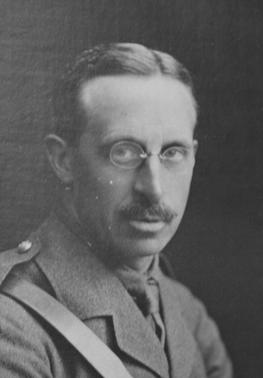
Percy Erskine Nobbs was a Canadian architect who was born in Haddington, East Lothian, and trained in the United Kingdom. Educated at the Edinburgh Collegiate School and Edinburgh University, he spent most of his career in the Montreal area. Often working in partnership with George Taylor Hyde, Nobbs designed a great many of what would become Montreal's heritage buildings and was a key Canadian proponent of the Arts and Crafts Movement in architecture. He served as the director of McGill University's School of Architecture for ten years and designed many buildings on the campus as well as McGill's Coat of Arms, which continues to be used today.

Percival Molson Memorial Stadium is an outdoor football and multi-purpose stadium in Downtown Montreal, on the slopes of Mount Royal, in the borough of Ville-Marie. Named in honour of Percival Molson, and owned by McGill University, it was the home of the Montreal Alouettes of the Canadian Football League from 1954 to 1967 and again since 1998. The stadium is also home to the McGill Redbirds and Martlets of the RSEQ, the Montreal Royal of the American Ultimate Disc League, the Selwyn House Gryphons high-school football team and the Canadian Corporate Soccer League, the largest amateur corporate league in Canada.
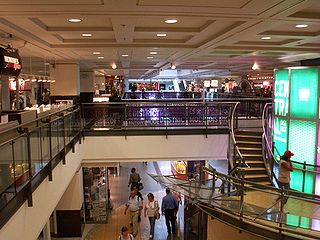
RÉSO, commonly referred to as the Underground City, is the name applied to a series of interconnected office towers, hotels, shopping centres, residential and commercial complexes, convention halls, universities and performing arts venues that form the heart of Montreal's central business district, colloquially referred to as Downtown Montreal. The name refers to the underground connections between the buildings that compose the network, in addition to the network's complete integration with the city's entirely underground rapid transit system, the Montreal Metro. Moreover, the first iteration of the Underground City was developed out of the open pit at the southern entrance to the Mount Royal Tunnel, where Place Ville Marie and Central Station stand today.

McGill station is a Montreal Metro station in the borough of Ville-Marie in the downtown core of Montreal, Quebec, Canada. It is operated by the Société de transport de Montréal (STM) and serves the Green Line. The station opened on October 14, 1966, as part of the original network of the Metro.

The Royal Victoria Hospital (RVH), colloquially known as the "Royal Vic" or "The Vic", is a hospital in Montreal, Quebec, Canada. It forms the largest base hospital of the McGill University Health Centre (MUHC), which is affiliated with McGill University. The hospital was established in 1893 and was based at Pine Avenue, now known as the Legacy site, until 2015, when major hospital operations were moved to the Glen site, named for the former Glen railway yards. The future uses of the Legacy site are now under study and it seems likely that the site, which is adjacent to its main campus, will be taken over by McGill University.
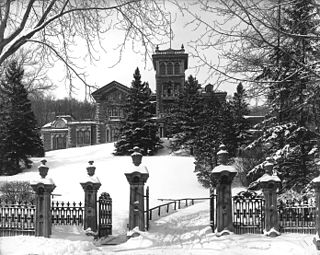
The Golden Square Mile, also known as the Square Mile, is the nostalgic name given to an urban neighbourhood developed principally between 1850 and 1930 at the foot of Mount Royal, in the west-central section of downtown Montreal in Quebec, Canada. The name 'Square Mile' has been used to refer to the area since the 1930s; prior to that, the neighbourhood was known as 'New Town' or 'Uptown'. The addition of 'Golden' was coined by Montreal journalist Charlie Lazarus, and the name has connections to contemporary real estate developments, as the historical delimitations of the Golden Square Mile overlap with Montreal's contemporary central business district.

Saint Laurent Boulevard, also known as Saint Lawrence Boulevard, is a major street in Montreal, Quebec, Canada. A commercial artery and cultural heritage site, the street runs north–south through the near-centre of city and is nicknamed The Main, which is the abbreviation for "Main Street".

Downtown Montreal is the central business district of Montreal, Quebec, Canada.

Place Montreal Trust is a shopping mall in Montreal, Quebec, Canada, located west of the Eaton Centre, at the corner of Saint Catherine Street and McGill College Avenue in the city's downtown core. With over 320,000 square feet (29,729 m2) of stores and services, Place Montreal Trust attracts 14 million visitors each year. Its indoor water fountain has the highest water spout in North America at 30 metres in height. Place Montreal Trust is linked to the Underground City of Montreal.

James McGill was a Scottish-Canadian businessman, fur trader, land speculator, and philanthropist best known for being the founder of McGill University in Montreal. He was elected to the Legislative Assembly of Lower Canada for Montreal West and appointed to the Executive Council of Lower Canada in 1792. He was the honorary Lieutenant-Colonel of the 1st Battalion, Montreal Militia, a predecessor unit of The Canadian Grenadier Guards. He was also a prominent member of the Château Clique and one of the original founding members of the Beaver Club. His summer home stood within the Golden Square Mile.
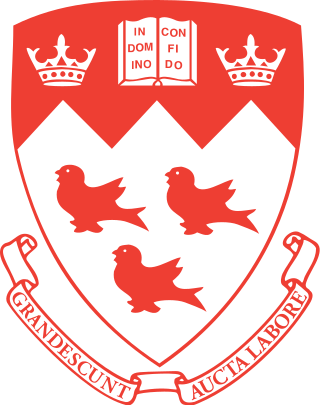
McGill University is an English-language public research university located in Montreal, Quebec, Canada. Founded in 1821 by royal charter, the university bears the name of James McGill, a Scottish merchant, whose bequest in 1813 established the University of McGill College. In 1885, the name was officially changed to McGill University.
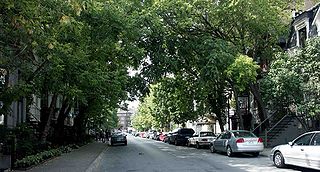
Milton Park, is a neighbourhood in Montreal, Quebec, Canada. It is named after the neighbourhood's two main streets, Milton Street and Park Avenue. It is situated directly to the east of the McGill University campus in the borough of Plateau-Mont-Royal. The area is roughly bordered by University Street and the university campus to the west, Sherbrooke Street to the south, Pine Avenue to the north, and Park Avenue and the Lower Plateau neighbourhood to the east, though McGill University considers this area to extend as far east as Saint Laurent Boulevard or just short of Saint-Louis Square.

McGill College Avenue is a street in downtown Montreal, Quebec, Canada. Named for McGill University, the street was widened in the 1980s and transformed into a scenic avenue with McGill's Roddick Gates on Sherbrooke Street at its north end and the Place Ville Marie plaza at its south end.
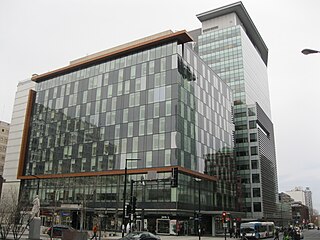
Quartier Concordia is a neighbourhood redevelopment project centred on Concordia University's Sir George Williams campus in downtown Montreal, Quebec, Canada. Bordered by Sherbrooke Street, Saint-Mathieu Street, René Lévesque Boulevard and Bishop Street, the district is designed to be a green urban campus that will improve the use and quality of public places and spaces, student life on campus and transportation.

Mackay Street is a street located in downtown Montreal, Quebec, Canada. Mackay Street is a one-way street, that begins at Sherbrooke Street West, travels southbound and ends at Overdale Avenue, just south of René Lévesque Boulevard.

The McTavish reservoir, named for Simon McTavish, is an underground reservoir and park located beside McGill University's campus on the southern slope of Mount Royal in Montreal, Quebec, Canada. It holds 37 million gallons of water and is supplied by its large Châteauesque style pump-houses situated in the south-eastern corner of the park. Atop the reservoir is Rutherford Park, and it is also the location of the McTavish automated weather reporting station.

Lady Meredith House, also known as the H. Vincent Meredith Residence, is a historic mansion located at 1110 Pine Avenue West on the corner of Peel Street, in what is today known as the Golden Square Mile of Montreal, Quebec. It was originally named Ardvarna and is now owned by McGill University. The building was designated as a National Historic Site of Canada on November 16, 1990. The house is situated at an altitude of 129 m.

The McCall MacBain Arts Building is a landmark building located at 853 Sherbrooke Street West in Montreal, Quebec, in the centre of McGill University's downtown campus. The Arts Building is the oldest existing building on campus, and it was designed in the Classical Revival style by John Ostell. Construction began in 1839, and the building's central block and east wing were completed in 1843. The west and north wings were finished in 1861 and 1925, respectively, after involving multiple architects, including Alexander Francis Dunlop and Harold Lea Fetherstonhaugh. Today, the Arts Building is made up of a central block and three distinct wings – Dawson Hall (east), Molson Hall (west) and Moyse Hall (north). The building currently houses the Department of French Language and Literature, the Department of English, and the Department of Art History and Communication Studies. It also hosts lectures for several other departments from the Faculty of Arts.
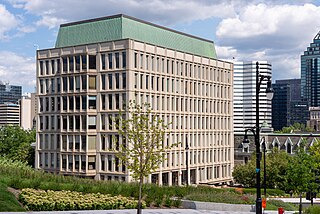
The Stephen Leacock Building, also known simply as the Leacock Building, is a building located at 855 Sherbrooke Street West, on the McGill University downtown campus in Montreal, Quebec. The building was named after Stephen Leacock, a well-known Canadian humorist and author, and Professor of Economics at McGill from 1901 to 1944. Built between 1962 and 1965 by the Montreal architectural firm Arcop, the Leacock Building's purpose was to accommodate the growing number of students at McGill, particularly in the Faculty of Arts which had outgrown its ancestral home, the Arts Building.






















